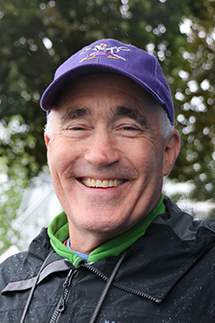Dr. Ian MacDonald, MD’79, PhD’89, who is currently the Faculty Lead, Curriculum Management Unit in the UBC Faculty of Medicine, is also a volunteer member of the Coquitlam Search and Rescue for the past 23 years.
MacDonald, MD’79, PhD’89, who is currently the Faculty Lead, Curriculum Management Unit in the UBC Faculty of Medicine, is also a volunteer member of the Coquitlam Search and Rescue for the past 23 years.
Describe what you do in a few sentences.
I work as the Faculty Lead of the Curriculum Management Unit in the UBC Faculty of Medicine (FOM). We are a small (3 people) unit within the Faculty of Medicine which keeps track of every educational session which takes place over years 1-4 of the undergraduate medical education program. We provide curricular data to several other units, and we ensure that every educational session is linked to, and is alignment with, course outcomes and FOM exit competencies.
What do you consider your greatest achievement to date?
Learning how to fly helicopters. Flying helicopters is very demanding and requires a lot of psychomotor skills which degrade with age, such as eye-hand coordination, multitasking, and visual processing. The Royal Air Force has a 100% failure rate for beginning helicopter pilots age 32 and above. I worked hard and was fortunate to earn my helicopter pilot’s license even though I was 35.
Please list a few of your current accolades/awards received, volunteer positions, and/or past job positions.
I have leveraged my MD degree in a variety of different ways, including general practice, emergency physician, critical care clinical assistant, occupational health physician, biomedical consultant, and biotech analyst for an investment firm.
The most important and satisfying volunteer work I’ve done has been as a member of Coquitlam Search and Rescue (SAR), an all-volunteer search & rescue team serving the northeast sector of the Lower Mainland. I’ve been a member for 23 years and participated in some amazing searches and rescues. Coquitlam SAR is a collection of highly skilled outdoors people who have a passion for helping those lost or injured in the wilderness, and I’m honoured to be able to contribute to such a professional organization.
Name the last book you couldn’t put down.
“A Beautiful Place to Die” by Malla Nunn. It is a crime mystery set in apartheid-era South Africa, a country which I’ve visited frequently, and Ms. Nunn is wonderfully evocative in describing the beautiful, sad reality of rural Natal as seen through the eyes of a mixed-race detective.
What is the best professional advice you’ve received?
Two UBC Georges taught me two of the most important things I learned in medical school: “Common sense isn’t so common.” (Dr. George Price), and “It takes 6 months to learn 80% of a subject and a lifetime to learn the other 20.” (Dr. George Gray).
What is your favourite UBC memory?
Wonderful, gooey UBC cinnamon buns; they were a special treat in those days as I didn’t have much money. I still love them.
Biggest risk you’ve taken to date?
Giving up practicing medicine for several years so I could pursue a career flying helicopters. I saw many wild things and met some wonderful people as a pilot, and in the process flew, literally, the length and breadth of Canada. I’ve fought forest fires, flown medevacs, landed on mountaintops; you name it!
What is your next challenge/goal?
I’m at a transitional point in my life and haven’t defined my next large challenge or goal quite yet.
What led you to choose your area of study for your MD?
I kind of drifted into general practice after completing my internship in Ottawa. I was not interested enough in any specialty to undertake residency training.
Did you almost study something else – or pursue a different path?
Yes, 4 years after graduation from med school I returned to UBC and began working on a PhD, in the Department of Microbiology. I enjoyed the lab-based research, and received my PhD, but opted to return to clinical medicine rather than pursue a research career.
What advice would you give to current Faculty of Medicine students?
I still tutor Year 1 & 2 Case Based Learning (CBL) groups and tell all my fretful students the same thing: just the fact that you’re sitting here in CBL means you’ve crossed the biggest hurdle to becoming a doctor, namely, getting into medical school. Put one foot in front of the other, stay on the path, do the work and you’ll do fine as a medical student; everyone wants to see you succeed, so if you’re having difficulties please reach out.
Please name a few of your favourite hobbies and activities.
I love reading, travelling, hiking, skiing. I don’t get enough time for them all!
Name something that is on your bucket list. Have you completed it?
I’m a James Bond fan and plan to attend the opening of James Bond 25 in London next spring. What could be more fitting than watching James Bond in London?
What are the best aspects of your career?
Knowing that I’m helping to maintain and improve one of the best undergraduate medical education programs in the world. Also, I love to write and this job gives me lots of opportunity to do so.
Comments are closed, but trackbacks and pingbacks are open.